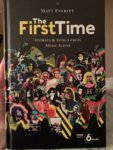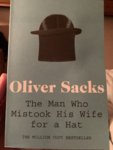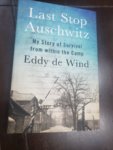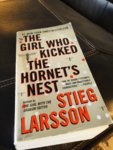I didn’t hate-read Trust Exercise, but I definitely barreled through it hoping to find a point where the book explained itself to me. All the reviews, accolades, and Obama year-end lists really propped this one up to be something special and incisive, but I found it to be…well, when I described the plot to my wife, she said “so it’s a soap opera?”
Thematically, the book’s trying to do some really good work. I don’t think it succeeds, but I read a couple of articles about it once I was done, and I appreciated it more for what others gleaned from it than what I got out of reading it. In reality, I found it overwritten, the characters were incredibly thin, and its points are made clumsily and overtly. Also, the depiction of high school sex is really weird and gross; at one point the fifteen year-old protagonists strip down completely and do the dirty deed in a high school hallway during school hours. It’s written as passionate and urgent, but I simply found it gross and pretty out of character for teenagers.
A major theme of the book is how men in positions of power (especially charismatic teacher types) are given license to abuse those around them, and how we can blind ourselves to that fact for the sake of hero worship. This is illustrated through a drama teacher, Mr Kingsley, who teaches an acting class in a liberal arts high school in the 80s. The first scene involves him turning off the lights in the classroom and having the students grope around and identify one another by touch. There’s no reveal here; the guy is an irresponsible creep due for a lawsuit, and it baffled me that the book was supposed to pull the curtain back on the guy; he’s a monster from the outset. All of the adults are irresponsible monsters or they’re completely absent, which lends an air of cartoonishness to it all.
What kept me going through the first half was having read in a review (minor spoiler) that the first half of the book turns out to be the text of a novel written by that section’s narrator a decade after the fact. The story pulls out to a character sidelined in the first half, Karen, who knows “what really happened” during the first half. Unfortunately, the reckoning promised by such a setup doesn’t come; Karen isn’t there to set the record straight so much as to shine some light on her own Personal Drama. Karen is an even worse narrator, jumping between first and third person willy-nilly, going on pages-long tangents about what the word “memory” means. From there, the story sets its sights on a revenge that isn’t very satisfying and can be seen from a mile away (when you have someone with a capital-u-m Ulterior Motive providing a prop gun for a play and then explaining Brandon Lee and the concept of Chekov’s Gun in the same scene, the tension drains a bit).
I wouldn’t discourage anyone from reading this book; in fact, the opposite. As I mentioned, it seems this book gave people a lot to think on, and I’ve gotten a lot out of that, more than I’ve gotten out of the book itself. So please check it out, so we can either have a respectful debate over its pros and cons, or so we can both dunk on it relentlessly.




